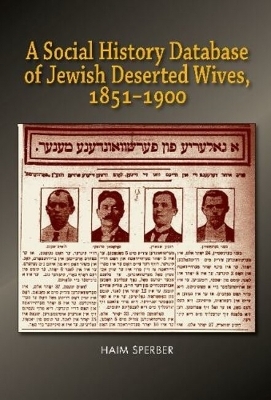
A Social History Database of East European Jewish Deserted Wives, 1851-1900
Seiten
2022
Liverpool University Press (Verlag)
978-1-78976-167-2 (ISBN)
Liverpool University Press (Verlag)
978-1-78976-167-2 (ISBN)
Agunot (Agunah, sing., meaning anchored in Hebrew) is a Jewish term describing women who cannot remarry because their husband has disappeared. Women whose husbands cannot be located, and who have not been granted a Get, are considered Agunot. women whose husbands became mentally ill and were not competent to grant a Get;
The Database is a companion volume to The Plight of Jewish Deserted Wives, 18511900 (978-1-78976-168-9). It comprises circa 5000 entries, providing name, date and circumstance, with extensive cross-reference to aid future researchers. Agunot (Agunah, sing., meaning anchored in Hebrew) is a Jewish term describing women who cannot remarry because their husband has disappeared. According to Jewish law (Halacha) a woman can get out of the marriage only if the husband releases her by granting a divorce writ (Get), if he dies, or if his whereabouts is not known. Women whose husbands cannot be located, and who have not been granted a Get, are considered Agunot. The Agunah phenomenon was of major concern in East European Jewry and much referred to in Hebrew and Yiddish media and fiction. Most nineteenth-century Agunot cases came from Eastern Europe, where most Jews resided (twentieth-century Agunot were primarily in North America, and will be the subject of a forthcoming book). Seven variations of Agunot have been identified: Deserted wives; women who refused to receive, or were not granted, a Get; widowed women whose brothers-in-law refused to grant them permission to marry someone else (Halitza); women whose husbands remains were not found; improperly or incorrectly written Gets; women whose husbands became mentally ill and were not competent to grant a Get; women refused a Get by husbands who had converted to Christianity or Islam.
The Database is a companion volume to The Plight of Jewish Deserted Wives, 18511900 (978-1-78976-168-9). It comprises circa 5000 entries, providing name, date and circumstance, with extensive cross-reference to aid future researchers. Agunot (Agunah, sing., meaning anchored in Hebrew) is a Jewish term describing women who cannot remarry because their husband has disappeared. According to Jewish law (Halacha) a woman can get out of the marriage only if the husband releases her by granting a divorce writ (Get), if he dies, or if his whereabouts is not known. Women whose husbands cannot be located, and who have not been granted a Get, are considered Agunot. The Agunah phenomenon was of major concern in East European Jewry and much referred to in Hebrew and Yiddish media and fiction. Most nineteenth-century Agunot cases came from Eastern Europe, where most Jews resided (twentieth-century Agunot were primarily in North America, and will be the subject of a forthcoming book). Seven variations of Agunot have been identified: Deserted wives; women who refused to receive, or were not granted, a Get; widowed women whose brothers-in-law refused to grant them permission to marry someone else (Halitza); women whose husbands remains were not found; improperly or incorrectly written Gets; women whose husbands became mentally ill and were not competent to grant a Get; women refused a Get by husbands who had converted to Christianity or Islam.
Dr. Haim Sperber is Head of the Multi-Cultural Studies Department at the Western Galilee College. He has published widely on the history of the Jewish family, especially the Agunot phenomenon; Anglo-Jewish Philanthropy; Women and Immigration; and Urbanization and Crime in modern Jewish history.
| Erscheinungsdatum | 07.11.2022 |
|---|---|
| Verlagsort | Liverpool |
| Sprache | englisch |
| Maße | 210 x 297 mm |
| Themenwelt | Sachbuch/Ratgeber ► Geschichte / Politik ► Allgemeines / Lexika |
| Geschichte ► Allgemeine Geschichte ► Neuzeit (bis 1918) | |
| Geschichte ► Teilgebiete der Geschichte ► Kulturgeschichte | |
| Geschichte ► Teilgebiete der Geschichte ► Sozialgeschichte | |
| Sozialwissenschaften ► Soziologie ► Spezielle Soziologien | |
| ISBN-10 | 1-78976-167-0 / 1789761670 |
| ISBN-13 | 978-1-78976-167-2 / 9781789761672 |
| Zustand | Neuware |
| Haben Sie eine Frage zum Produkt? |
Mehr entdecken
aus dem Bereich
aus dem Bereich
Europa 1848/49 und der Kampf für eine neue Welt
Buch | Hardcover (2023)
DVA (Verlag)
48,00 €
Giordano Bruno - ein ketzerisches Leben
Buch | Hardcover (2024)
C.H.Beck (Verlag)
29,90 €
Kunst und Gesellschaft an der Schwelle zur globalen Welt
Buch | Hardcover (2024)
Klett-Cotta (Verlag)
42,00 €


